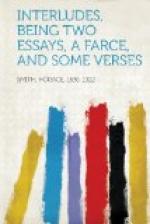I. ON CRITICISM.
Criticism is the art of judging. As reasonable persons we are called upon to be constantly pronouncing judgment, and either acting upon such judgment ourselves or inviting others to do so. I do not know how anything can be more important with respect to any matter than the forming a right judgment about it. We pray that we may have “a right judgment in all things.” I am aware that it is an old saying that “people are better than their opinions,” and it is a mercy that it is so, for very many persons not only are full of false opinions upon almost every subject, but even think that it is of no consequence what opinions they hold. Whether a particular action is morally right or wrong, or whether a book or a picture is really good or bad, is a matter upon which they form either no judgment or a wrong one with perfect equanimity. The secret of this state of mind is, I think, that it is on the whole too much bother to form a correct judgment; and it is so much easier to let things slide, and to take the good the gods provide you, than to carefully hold the scales until the balance is steady. But can anybody doubt that this abdication of the seat of judgment by large numbers of people is most hurtful to mankind? Does anyone believe that there would be so many bad books, bad pictures, and bad buildings in the world if people were more justly critical? Bad things continue to be produced in profusion, and worse things are born of them, because a vast number of people do not know that the things are bad, and do not care, even if they do know. What sells the endless trash published every day? Not the few purchasers who buy what is vile because they like it, but the many purchasers who do not know that the things are bad, and when they are told so, think there is not much harm in it after all. In short, they think that judging rightly is of no consequence and only a bore.
But I think I shall carry you all with me when I say that this society, almost by its very raison d’etre, desires to form just and proper judgments; and that one of the principal objects which we have in view in meeting together from time to time is to learn what should be thought, and what ought to be known; and by comparing our own judgments of things with those of our neighbours, to arrive at a just modification of our rough and imperfect ideas.
Although criticism is the act of judging in general, and although I shall not strictly limit my subject to any particular branch of criticism, yet naturally I shall be led to speak principally of that branch of which we—probably all of us—think at once when the word is mentioned, viz., literary and artistic criticism. I think if criticism were juster and fairer persons criticized would submit more readily to criticism. It is certain that criticism is generally resented. We—none of us—like to be told our faults.




